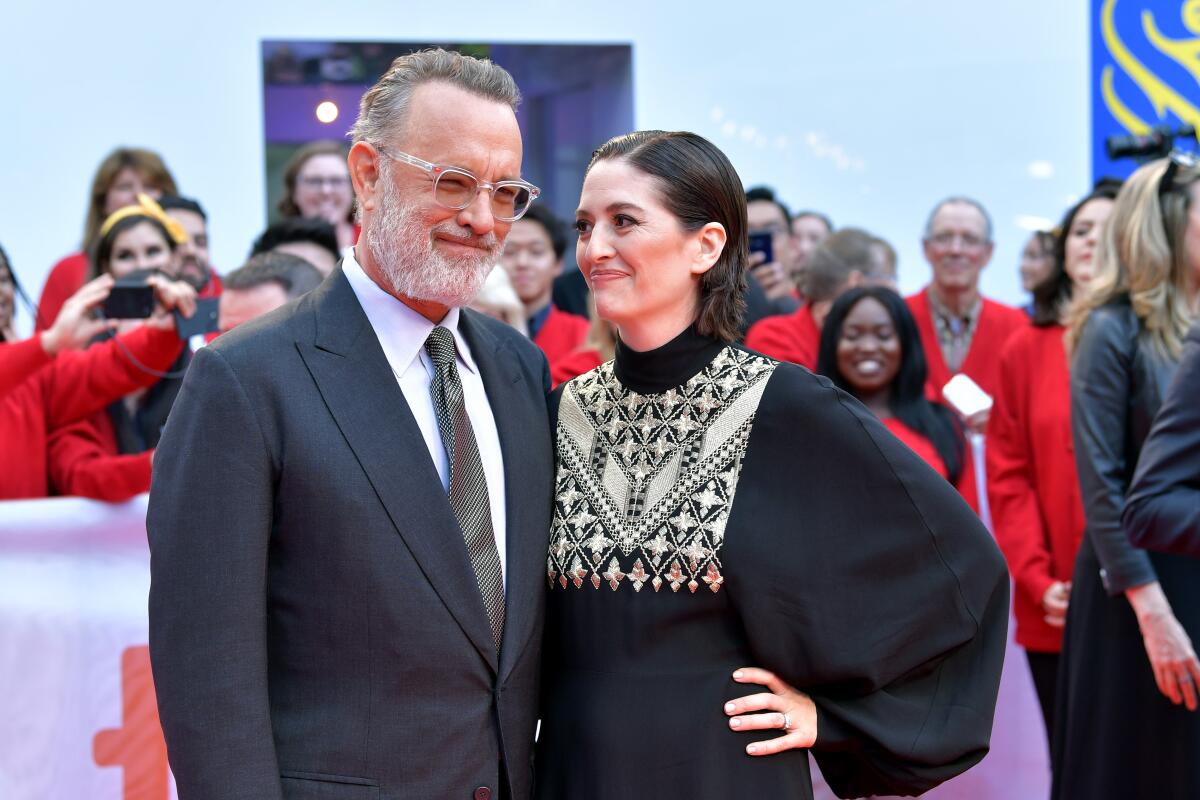Marielle Heller’s Mister Rogers film ‘A Beautiful Day in the Neighborhood’ asks you to check your cynicism at the door

- Share via
By the time she was four years old, Marielle Heller had already rejected “Mister Rogers’ Neighborhood.” As the eldest of three, she saw her younger siblings watching the PBS show and felt she had grown “too jaded and cynical” for Fred Rogers’ brand of cheery positivity.
It wasn’t until decades later, when she became a parent herself, that the filmmaker gave Rogers another shot. When her son turned 2, the first television program she and her husband allowed him to watch was “Daniel Tiger’s Neighborhood.” The animated kids series, which launched in 2012, is produced by Fred Rogers Productions and espouses many of the same values as the original Rogers show — teaching children how to deal with difficult emotions like anger, disappointment and loss.
“It’s like the parenting hack of all parenting hacks,” Heller said. “ It makes you a better parent, I swear to God, because it gives you, like, tips on how to deal with your children. And there’s an episode for everything. When you’re potty training, there’s an episode that we all have sung and quoted a bajillion times that’s, like, ‘When you need to go potty, stop and go right away! Flush and wash and be on your way.’”
Heller was steeped in the world of Daniel Tiger when the screenplay for “A Beautiful Day in the Neighborhood” came across her desk a couple of years ago. She’d worked with the writers of the script, Micah Fitzerman-Blue and Noah Harpster, on Amazon’s “Transparent,” and they’d mentioned they were trying to get a film made about Mister Rogers. At the time, however, the movie already had a director attached, but Heller nonetheless asked: “Why am I not directing that?”
“I said something very bold like that because it felt so up my alley, being a mom with a little kid,” Heller recalled with a laugh. The filmmaker, 40, had flown into Los Angeles last weekend for just a few days from Berlin, where she is acting in a television series. In an effort to stay alert for the Governors Awards that evening, she had just received an IV drip and a vitamin C shot in her behind.
When she was offered the directing gig on “A Beautiful Day in the Neighborhood” — which Sony Pictures will release on Nov. 22 — Heller had been anointed one of Hollywood’s top directors to watch. After spending years working primarily as a stage actress, she made her directorial debut in 2015 with the critical darling “The Diary of a Teenage Girl,” about a 15-year-old’s sexual awakening. Heller’s follow-up, last year’s “Can You Ever Forgive Me?,” was even better received. The film, which earned star Melissa McCarthy an Academy Award nomination, told the story of an author who forged letters by famous artists to make ends meet.
And — to the surprise of the producers on the Rogers film — she had also formed a relationship with the actor most coveted for the lead role: Tom Hanks. Coming off a period in which he’d played a handful of iconic real-life figures, including Capt. Chesley “Sully” Sullenberger and Walt Disney, Hanks had already passed on the “Neighborhood” script three times.
Heller had become friendly with the actor after meeting him at a backyard birthday party held by his son, Colin Hanks. During the gathering, Tom Hanks mentioned he’d just read an article in the New York Times about female directors. Heller pointed out she’d been quoted in the piece. Upon learning more about her, Hanks promised to watch “The Diary of a Teenage Girl.” He made good on his word and set up a meeting with the filmmaker, telling her, “We gotta find a way to work together.”
For years, Heller said, she and the actor would stay in touch, sending potential projects to each other. So when the team behind the Rogers film expressed how badly they wanted Hanks for their movie, Heller said she’d give it her best shot.
“So I called him and I described how I saw the movie — that I didn’t want it to be a biopic,” she remembered. “It was never going to be a prosthetics thing — it wasn’t going to be about trying to make him look just like [Rogers]. It was really a character piece about manhood and what it is to be a good person. And he was like, ‘Oh, OK, lemme go read the script with all of that in mind,’ and signed on like a week later.”
“A Beautiful Day in the Neighborhood” is far from a Rogers biopic. In fact, Hanks plays the supporting character in the film, which stars Matthew Rhys as an Esquire journalist tasked with profiling the TV legend. Based on Tom Junod’s 1998 magazine article about Rogers, the movie explores the effect the star had had on the writer, revealing less about himself in interviews than expressing a genuine interest in the journalist himself.
Shortly after the movie was greenlit, however, Morgan Neville’s hit documentary about Rogers, “Won’t You Be My Neighbor?” was released in theaters. The movie collected $22.8 million in theaters, making it a huge box office success for a nonfiction film. At first, Heller admitted, “we had a moment where we kind of were, like, ‘Oh, is this a good thing or a bad thing?’
“And then we thought, ‘Oh, more Fred Rogers in the world? This is a good thing,” she said. “And I knew that focusing on Fred Rogers as the lead in our film wouldn’t work, because he’s too good. He’s not a character who’s going to change. Your protagonist has to go through a major, life-transforming arc, and he’s too evolved. At one point, I was working on the Ruth Bader Ginsburg project [2018’s “On the Basis of Sex”], and part of what I struggled with on that script was how she was already so who she is. It’s hard when people are born amazing.”
Before filming began, Heller visited Pittsburgh, where Rogers lived and worked for nearly his entire life. She visited the Fred Rogers Co., meeting with executives who’d worked there for nearly four decades and had been integral to the PBS show. She went to Latrobe, Penn., Rogers’ hometown, where his archives are housed, sifting through the hundreds of boxes of letters, photographs and emails he’d meticulously stored until his death in 2003. She also met with Rogers’ widow, 91-year-old Joanne Rogers, who lent her late husband’s ties to the production and frequently visited the set during shooting.
“She’s just a darling,” Rogers said of Heller in a phone call. “I’m so impressed with her as a mom, because she had her son and husband with her the whole time. And I got the best feeling about her from a thing they did at the Toronto [International Film Festival]. I listened to them during a press conference, and I thought, ‘There are two people who really get Fred. One of them is Marielle, and the other is Matthew.’ They are both raising young kids. She knew where Fred was coming from because she’s a mom right now.”
As a parent, Heller agreed, she’d come to recognize how “brilliant and intuitive” Rogers was in the way he addressed children with respect. She said she’s come to feel that society often doesn’t treat kids as humans whose feelings matter.
“There’s a lot of like, ‘Pep up, deal with it,’” she said. “You’re talking to them like they’re a dog. We don’t tend to recognize how kids are experiencing the world. So when you actually get to see a show like [Rogers’] that truly knows how to talk to kids — and you’re raising a kid, so it’s the thing that you care about more than anything in the world — it’s really touching.
“He was trying to give us all a chance to really be able to access our emotions and say, ‘I’m scared right now, and this is why I’m scared, and what do I do when I feel scared?’” she continued. “These are simple things, but a lot of us as grownups still struggle with them. So in many ways, what he was doing for each of us was really radical.”
What Hanks said he admired about Heller’s approach to conveying Rogers’ beliefs was that she made it a “slow-cooking recipe” without “fakery or trickery,” allowing the character to express his identity through his actions instead of words.
Rogers “was not introduced as: here’s the most important man there is,” the actor explained. “She captured who he was without trying to explain it. She showed it through his behavior, and the behavior of others when they were around him.”

“A Beautiful Day in the Neighborhood” is the first film Heller has made in partnership with a major studio, and she acknowledges that each of her projects has grown in budget and expectation. Along the way, she’s been offered projects that she felt she should take just because “women aren’t being offered that kind of thing, so I should do it for all of us.” But she’s still leery of those within the studio system who say they want to hire female filmmakers: “I think for a lot of the bigger kind of corporations, they’re doing it because it is what they’re meant to do right now. They are being pressured. I think we still haven’t gotten past the point where they think of that as a risk.”
Working on the Rogers film, she said, has served as a necessary reminder of who she “wants to be in the world.”
“I think I have so much work to do on myself, as we all do, and I want to be a better person and better parent and better leader of a movie — the captain of that ship,” she said. “It feels really good to get to talk about the fact that I’ve directed three movies in the last six years. It’s nice to start to be like, ‘No, here, look, I’m here to stay. I’m making a longer career for myself.’ Three movies in, I’m going to keep going. It’s a good feeling.”
Times staff writer Yvonne Villarreal contributed to this report.
More to Read
Only good movies
Get the Indie Focus newsletter, Mark Olsen's weekly guide to the world of cinema.
You may occasionally receive promotional content from the Los Angeles Times.











